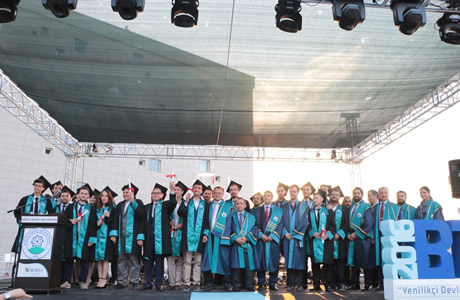
The project, coordinated by Prof. Dr. Deniz Uzunsoy, has been accepted under the Horizon Europe Marie Skłodowska-Curie Actions (MSCA) Staff Exchanges, one of the European Union’s most prestigious research programmes. With this project focusing on the recycling of metallic materials, BTU became one of three universities from Türkiye whose projects were funded as “coordinator”.
BTU academics continue to receive national and international support for their innovative projects. In this context, Bursa Technical University achieved a significant success in the 2024 call of the Horizon Europe Marie Skłodowska-Curie Actions (MSCA) Staff Exchanges programme, one of the EU's most important research programmes. The project entitled “Sustainable Production of High Entropy Alloys from Secondary Metals” (SUSHEAS), coordinated by Prof. Dr. Deniz Uzunsoy from the Department of Metallurgical and Materials Engineering at the Faculty of Engineering and Natural Sciences, was awarded a total funding of 736,476 Euros. As one of only three universities in Türkiye to receive support under the programme, Bursa Technical University has also become one of the few institutions in Europe to achieve this important success.
The Project Will Progress with 7 Partners
In this international consortium project, alongside BTU, the partners include: Brunel University London (UK), Norges Teknisk-Naturvitenskapelige Universitet – NTNU (Norway), Saglam Metal Sanayi ve Ticaret A.S. (Türkiye), Suranaree University of Technology (Thailand), Universidade do Porto (Portugal), Bournemouth University (UK), and International Iberian Nanotechnology Laboratory (Portugal).
Reducing Dependence on Primary Raw Materials
Providing information about the SUSHEAS project, Prof. Dr. Deniz Uzunsoy stated that the study stands out as an innovative step in environmental sustainability and materials technology. Prof. Dr. Uzunsoy said, “Within the scope of the project, we aim to reduce dependence on primary raw materials in the production of chemically complex and multi-component high entropy alloys (HEAs). Through this study, we will enable the recovery of already recycled secondary metals. In this way, we will develop more environmentally friendly and energy-efficient production methods.”
Significant Contribution to Industrial Processes
Highlighting that today’s HEA production mainly relies on costly and environmentally impactful primary resources, Prof. Dr. Deniz Uzunsoy noted that the SUSHEAS project aims to bring a new sustainability-focused vision to the field by recovering secondary metals. Prof. Dr. Uzunsoy added, “Our study will also play a role in industrial applications, such as AI-assisted optimization, metal recovery, improvement of production processes, characterization studies, and prototype demonstrations. Moreover, it will make a difference by enabling strategic researcher exchanges that strengthen the transfer of knowledge and experience between academic and industrial stakeholders.”
"Laying the Foundations of Future Engineering Materials Production"
Prof. Dr. Uzunsoy stated, “Our project not only contributes to the widespread adoption of sustainable methods in the production of high entropy alloys but also aims to lay the foundations for environmentally friendly production approaches for the advanced engineering materials of the future.”
Rector Çağlar: MSCA 2024 Success Once Again Proves Our University’s Research Potential
Congratulating Prof. Dr. Deniz Uzunsoy and the project team, BTU Rector Prof. Dr. Naci Çağlar underlined the significance of BTU receiving support from such a prestigious programme. Emphasizing that Bursa Technical University is one of only three universities in Türkiye to be awarded, Rector Naci Çağlar said, “In line with our research-oriented university vision, the ongoing strengthening of our institutional competence in project development and accessing international funds has once again shown us that we are on the right path. The fact that our academic potential is being acknowledged on a European scale clearly demonstrates the high level our scientific output has reached. In this direction, I am deeply confident that our project supports will increase both nationally and internationally, and I congratulate all our academics who contributed to this achievement.






 Bologna Information Package
Bologna Information Package
 e-Campus
e-Campus
 Erasmus+
Erasmus+
 Food Services & Campus Card
Food Services & Campus Card
 International Students
International Students

